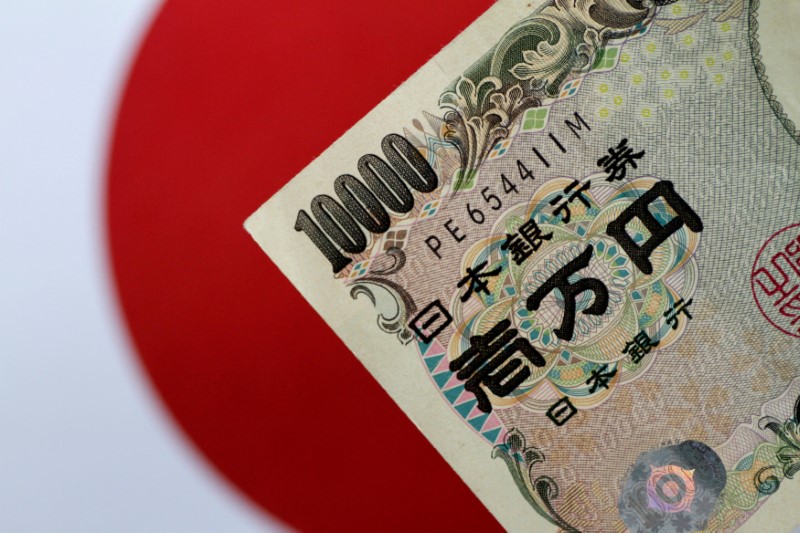By Tomo Uetake and Daniel Leussink
TOKYO (Reuters) - Japan's latest tweak to its ultra-easy monetary policy settings has nudged its bond yields higher but not nearly enough to entice hundreds of billions of dollars worth of Japanese investment in overseas debt to return home.
At this week's policy review, the Bank of Japan (BOJ) signaled a greater tolerance for higher rates, allowing 10-year bonds to trade at yields as high as 0.2 percent and forcing a rethink among domestic investors who have as much as 232 trillion yen ($2.1 trillion) in higher-yielding foreign currency debt.
Take the case of the 30-year paper. If yields on this maturity climb to 1 percent, up about 15 basis points from current levels, these bonds will become an attractive alternative to yen-based investments in U.S. and European debt.
Moreover, if the yen appreciates on rising yields, it then gets costlier to put money to work overseas, in which case keeping their yen invested in Japanese government bonds (JGBs) becomes a more attractive option.
Masahiko Loo, a portfolio manager at AllianceBernstein in Tokyo, said the rise in yields this week wasn't sufficient to lure Japanese investors away from U.S. and other higher yielding markets.
"If 30-year JGBs sell off to 1 percent, we think that Japanese investors will definitely be repatriating some of their foreign assets back to JGBs," Loo said.
With a negative short-term policy rate, and 10-year bonds trading around 0.13 percent, Japan is easily one of the world's lowest yielding markets.
That is one big reason why Japanese investors have traditionally ploughed swathes of cash into foreign debt. Ten-year Treasuries yield 2.99 percent, German bunds of that tenor yield 0.46 percent and Italian debt returns 2.9 percent.
All the same, these investments in dollars or euros carry exchange rate risk that could erode returns. Japanese investors have traditionally chosen to buy protection against that risk on most of their foreign bond investments.
A short-term hedge for an investment in U.S. dollars could set a yen investor back by as much as 2.6 to 2.9 percent, meaning net returns on Treasuries are just around 37 basis points at most.
The bulk of Japanese overseas debt holdings is in dollars, a legacy of their investment when dollar hedging costs were much lower. At the end of 2017, they held about $1.3 trillion worth of dollar debt, $458 billion of debt in euros and $178 billion in Australian dollars.
THE 1 PERCENT WAIT
Thirty-year JGBs now yield about 0.85 percent, up 17 bps in the past two weeks and another 15-20 bps of increases to 1.0 percent could swing Japanese investors in their favor.
The policy announcement this week, however, underwhelmed investors. While the BOJ raised the upper bound on 10-year bond yields to 0.2 percent, double the earlier limit, it committed to keeping longer term rates low under its 5-year long qualitative and quantitative easing program.
"That pretty much seals the fate of the Japanese investor. He's got to go elsewhere," said Bob Smith, President of Sage Advisory Services Ltd.
Japan's life insurance companies in particular have been waiting for a minimum yield of 1 percent on their long term bond holdings ever since the BOJ's switch to negative interest rates and a yield-targeting policy in 2016.
That's because the estimated average return these insurance firms have promised their policyholders over the years is close to 1 percent.
"Domestic bond yields have not risen to the levels that would attract aggressive buying from Japanese investors,” said Atsushi Tachibana, chief investment officer at Japan Post Insurance (Kampo) (T:7181).
Kampo is Japan's largest insurance company with assets of 77 trillion yen as of end-March.
Nippon Life, Japan’s largest private life insurance company, with assets of 66 trillion yen as of end-March, also said it plans to increase its holdings of foreign bonds, but without currency hedging.
"The BOJ policy changes are not material enough to steepen the JGB curve and incentivize Japanese investors to repatriate investments in the U.S. and Europe," said Ed Al-Hussainy, an analyst at Columbia Threadneedle Investments in Minneapolis.
